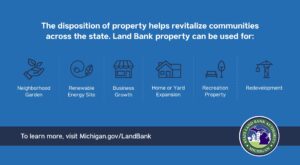On September 30, 2022, Michigan‘s governor, Gretchen Whitmer announced $21.55 million in community revitalization funding for a competitive grant program to address vacant, abandoned, and deteriorated properties across Michigan.
It will be administered by the State Land Bank Authority (SLBA), a leading-edge organization that has been a client of mine (Storm Cunningham). The SLBA works to create a positive economic impact on Michigan communities by facilitating productive reuse of land.
 “Removing blighted properties is an important step in stabilizing and revitalizing local communities,” said Emily Doerr, Executive Director of the SLBA.
“Removing blighted properties is an important step in stabilizing and revitalizing local communities,” said Emily Doerr, Executive Director of the SLBA.
“This funding allows us to further our efforts toward transforming blighted structures into functional spaces that will once again contribute to our economy. We encourage land banks and communities across Michigan to explore partnerships and identify projects that are eligible for this transformational grant opportunity,” she continued.
The governor’s 2023 bipartisan fiscal year budget included $75 million in blight elimination funds to aid in the economic redevelopment of targeted locations by removing vacant, unused structures and houses.
Of that investment, $21.55 million is now available through a grant process to be used by local land banks and/or municipalities.
The SLBA has opened the Request for Proposals (RFP) to local land banks, and to county, city, village, or township officials who do not have a local land bank.
“As governor, I am focused on investing in communities across Michigan to make them a better place to raise a family, start a business, and pursue your potential,” said Governor Whitmer.
“Michigan’s bipartisan, $75 million investment in blight elimination will help communities across the state increase surrounding property values, improve the health of local housing markets, remove safety hazards, and boost local tax revenue. Getting this done will help us build safer, more prosperous communities and create areas for new small businesses, housing, and green space, converting underutilized land into productive spaces for the community,” she added.
Cities, townships, counties and land banks can apply for the grant funding. Grant funds may be used to:
- Stabilize vacant residential, commercial and industrial buildings to secure them and protect against further deterioration, with the goal of preserving them for future rehab to purposeful use;
- Demolish vacant and blighted residential, commercial and industrial structures that cannot be rehabilitated; and
- Provide matching or gap funding for environmental remediation on vacant land – often a critical barrier to redevelopment.
Rural counties without land banks and county land banks are eligible for a guaranteed minimum allocation of $200,000, as long as a completed application with eligible projects is submitted.
The $21.55 million in funding was requested by the Michigan Association of Land Banks with the assistance of the Center for Community Progress to ensure all communities, regardless of their local land bank status, had access to blight elimination funds.
“This is an exciting opportunity for communities across Michigan to improve neighborhoods,” said Anne Giroux, Michigan Association of Land Banks President.
“The Michigan Association of Land Banks thanks the legislature and Governor for their important, bipartisan support of blight elimination efforts. This investment in Michigan’s communities will directly improve the lives of Michigan residents and we look forward to working with the State Land Bank to put these funds to work throughout Michigan,” she explained.
The State Land Bank Authority works to create a positive economic impact on Michigan communities by facilitating productive reuse of land. They work in a coordinated manner to foster the development of property to promote and support land bank operations at the county and local levels.
Returning property back to productive use plays an important role in community revitalization efforts, though it’s far more effective when coupled with a proven revitalization process.
The disposition of property helps revitalize communities across Michigan by selling vacant, abandoned, foreclosed, blighted or otherwise unproductive property to an owner who wants to recycle it into productive use.
This is a collaborative effort to create a better quality of life for residents and put property back on the tax-roll.
Photo of blight in Benzie County courtesy of Michigan Association of Land Banks.

